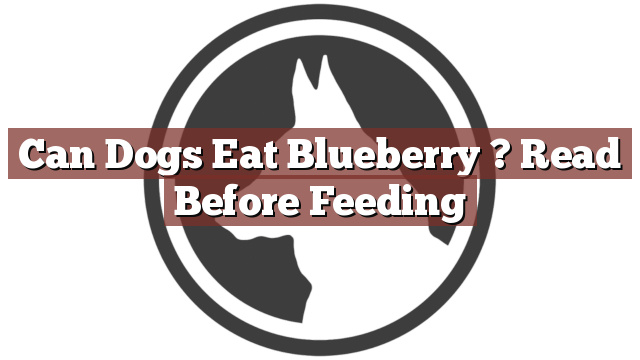Understanding Your Dog’s Dietary Needs
As responsible pet owners, it is crucial to understand the dietary needs of our furry friends. Dogs require a balanced diet that consists of proteins, fats, carbohydrates, vitamins, and minerals to maintain their overall health and well-being. While it is tempting to share our favorite foods with them, it is important to remember that some human foods can be harmful to dogs. Therefore, it is essential to educate ourselves about what is safe and beneficial for our canine companions.
Can Dogs Eat Blueberry? Read Before Feeding
Can dogs eat blueberries? This is a common question that many dog owners ask. The answer is yes, dogs can eat blueberries in moderation. Blueberries are packed with essential vitamins and minerals that can benefit your dog’s health. They are low in calories and high in antioxidants, making them a nutritious treat for your four-legged friend. However, as with any new food, it is important to introduce blueberries gradually into your dog’s diet and monitor for any adverse reactions.
Pros and Cons of Feeding Blueberries to Dogs
Feeding blueberries to your dog can have several benefits. Blueberries are rich in antioxidants, such as vitamin C and vitamin E, which help in boosting the immune system and fighting off free radicals that can cause cell damage. Additionally, the fiber content in blueberries can aid in digestion and promote a healthy gut. These tiny fruits also contain phytochemicals that have anti-inflammatory properties, which may benefit dogs with joint issues or other inflammatory conditions.
While blueberries can be a healthy addition to your dog’s diet, there are a few things to keep in mind. Blueberries contain natural sugars, so it is important not to overfeed them to your dog. Excessive consumption of blueberries may lead to digestive issues like diarrhea or upset stomach. Furthermore, it is crucial to remember that every dog is unique, and some may have individual allergies or sensitivities to certain fruits. If you notice any adverse reactions after feeding blueberries to your dog, it is best to consult with your veterinarian.
In Conclusion: Make an Informed Decision for Your Dog’s Health
In conclusion, blueberries can be a safe and healthy treat for your dog when given in moderation. They offer numerous nutritional benefits and can be a tasty addition to your dog’s diet. However, it is important to keep in mind your dog’s individual dietary needs and any potential allergies or sensitivities they may have. As with any new food, it is always best to introduce it gradually and monitor your dog for any adverse reactions. Ultimately, consulting with your veterinarian is the best way to make an informed decision regarding your dog’s dietary choices. By doing so, you can ensure that you are providing the best possible care for your beloved canine companion.
Thank you for taking the time to read through our exploration of [page_title]. As every dog lover knows, our furry friends have unique dietary needs and responses, often varying from one canine to another. This is why it's paramount to approach any changes in their diet with caution and knowledge.
Before introducing any new treats or making alterations to your dog's diet based on our insights, it's crucial to consult with a veterinarian about [page_title]. Their expertise ensures that the choices you make are well-suited to your particular pet's health and well-being.
Even seemingly harmless foods can sometimes lead to allergic reactions or digestive issues, which is why monitoring your dog after introducing any new food item is essential.
The content provided here on [page_title] is crafted with care, thorough research, and a genuine love for dogs. Nevertheless, it serves as a general guideline and should not be considered a substitute for professional veterinary advice.
Always prioritize the expert insights of your veterinarian, and remember that the health and happiness of your furry companion come first.
May your journey with your pet continue to be filled with joy, love, and safe culinary adventures. Happy reading, and even happier snacking for your canine friend!

